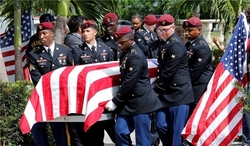 More American service members have been transported out of Iraq for medical treatment following retaliatory operation by Iran over Washington's assassination of Tehran's top commander, Lieutenant General Qassem Soleimani, the Pentagon announced on Tuesday, nearly two weeks after President Donald Trump and US defense officials initially claimed no one was hurt.
More American service members have been transported out of Iraq for medical treatment following retaliatory operation by Iran over Washington's assassination of Tehran's top commander, Lieutenant General Qassem Soleimani, the Pentagon announced on Tuesday, nearly two weeks after President Donald Trump and US defense officials initially claimed no one was hurt. RNA - The US Central Command announced on Tuesday that apart from the 11 previously announced injured, additional troops were being treated.
The CENTCOM refused to mention the exact figure to make the announcement as smoothly as possible in order to save the US military’s reputation in the wake of the disastrous defeat.
Spokesman for CENTOM Capt. Bill Urban claimed that the additional service members were moved "out of an abundance of caution" and that "it is possible additional injuries may be identified in the future".
"As medical treatment and evaluations in theater continue, additional service members have been identified as having potential injuries," Urban said, adding, "These service members --- out of an abundance of caution --- have been transported to Landstuhl, Germany, for further evaluations and necessary treatment on an outpatient basis. Given the nature of injuries already noted, it is possible additional injuries may be identified in the future."
On Thursday, US Central Command had revealed that 11 personnel stationed at the Iraqi airbase had to be sent out of the country after displaying concussion symptoms.
The Tuesday's statement did not address the condition of the first 11 service members transported out of Iraq.
Meantime, a leading Kuwaiti newspaper disclosed on Sunday 16 US military men with fatal injuries sustained during Iran's retaliatory missile strikes on Ain Al-Assad base earlier this month have been taken to a hospital in camp Arifjan in Ahmed al-Jaber airbase in Kuwait.
The Arabic-language Al-Qabas paper quoted informed sources as saying on Sunday that the 16 US militaries, included some whose bodies had been severely burnt and some others who had sustained shrapnel wounds, have been transferred to a US military hospital in Kuwait under strict security measures.
It added that the wounded military men have gone under surgical operations and are still kept at the ICU section of the hospital.
According to the paper, several other US forces who had sustained mild injuries in Iran's missile strike are being treated in Iraq.
The US president and the Pentagone initially claimed no service members were killed or wounded, and they signaled that Washington was not looking for additional armed conflict with Tehran. Trump stated soon after the missile attack that “no Americans were harmed", and the United States suffered "no casualties", noting that "all of our soldiers are safe, and only minimal damage was sustained at our military bases".
Ein Al-Assad, which houses US troops, is one of the largest and oldest military bases and located in Al-Anbar province in Western Iraq. It found itself under fire from volleys of ballistic missiles launched from Iran days after a US drone strike near Baghdad assassinated the Islamic Revolution Guards Corps (IRGC) Qods Force Commander who played a major role in beating the Islamic State of Iraq and the Levant (ISIL, ISIS or Daesh) terror group in both Syria and Iraq.
His assassination has inflamed tensions between Washington and Tehran, and drew a harsh rebuke from Baghdad, prompting the Iraqi Parliament to pass a resolution ordering American forces to leave the country.
Experts and pundits have been surprised by improvements in Iranian ballistic prowess after satellite images displayed accuracy of Iranian missile strikes on US airbase.
Briefing media on operational objective of missile attacks on US bases, IRGC Aerospace Commander Brigadier General Ali Hajizadeh stated that Iran was not after killing anyone although "tens of US troops have likely been killed and wounded and were transfered to Israel and Jordan on 9 sorties of C-130 flights".
He noted that had Iran intended to kill the American forces, it could have planned high casualty operations to kill 500 US military men in the first step and 4,000 to 5,000 others in the second and third phases within 48 hours.
Supreme Leader of the Islamic Revolution Ayatollah Seyed Ali Khamenei has called the military operation "only a slap across the face" of the United States, stating that "military moves like this are not enought. The Americans' corruption-stirring presence should come to an end".
Tehran reiterates that its strategic objective is expelling the US troops from the region, naming it the true vengeance for the terror attack on its most popular commander.
847/940